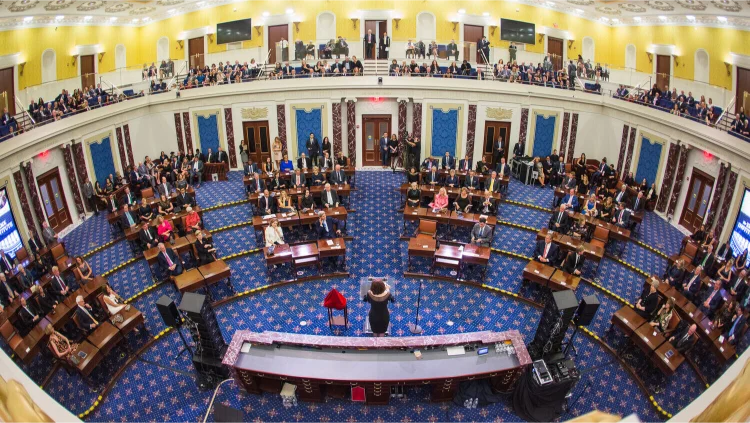The U.S. Senate has just passed a massive $95 billion foreign aid bill that gets aid to Ukraine, Israel, and Taiwan. The bill now moves to the House where it is expected to meet major opposition over lack of funding to America’s southern border.
The bill, which passed with a vote of 70 to 29 with 22 Republicans voting in favor, including Senate Minority Leader Mitch McConnell, provides $95 billion in aid, $60bn of which would be sent to Ukraine, $14billion of which would be directed to Israel, and almost $10 billion for humanitarian aid for civilians in conflict zones, including Palestinians in Gaza.
“History settles every account,” McConnell said in a statement following the vote. “And today, on the value of American leadership and strength, history will record that the Senate did not blink.
Senate Majority Leader Chuck Schumer celebrated passage of the legislation, saying in remarks on the floor, “It’s been years, perhaps decades, since the Senate passed a bill that so greatly impacts not just our national security, not just the security of our allies, but the security of western democracy.”
“I believe that if Speaker Johnson brought this bill to the House floor, it will pass with the same strong bipartisan support,” Schumer said.
The vote occurred in the context of increasing internal disagreements within the Republican Party concerning the United States’ international engagements. It followed a prolonged discussion led by a minor faction of Republicans who, in opposition to allocating $60 billion to Ukraine, occupied the Senate floor overnight. They contended that the U.S. ought to prioritize addressing its domestic issues before extending further financial support abroad. Nevertheless, a coalition of 22 Republicans and the majority of Democrats united to approve the funding, asserting that failing to support Ukraine might empower Russian President Vladimir Putin and pose a threat to global security.
Ukrainian President Volodymyr Zelensky welcomed the news in a statement Tuesday, thanking Schumer, McConnell and “every US Senator who has supported continued assistance to Ukraine as we fight for freedom, democracy, and the values we all hold dear.”
“For us in Ukraine, continued US assistance helps to save human lives from Russian terror. It means that life will continue in our cities and will triumph over war,” Zelensky said on X. “American assistance brings just peace in Ukraine closer and restores global stability, resulting in increased security and prosperity for all Americans and all the free world.”
Many Republican opponents criticized the bill for not including stringent border restrictions for the United States. They were also instrumental in defeating an earlier version of the bill that would have combined aid with tougher border enforcement measures, such as stricter asylum laws, increased detention capacity, and faster deportations.
Sen. Rand Paul of Kentucky voiced concerns about border security, stating, “A literal invasion is coming across our border,” and criticized the Senate’s priorities. Other Republicans questioned the wisdom of sending substantial aid to Ukraine, doubting Kyiv’s ability to prevail over Russia.
Senator Ron Johnson labeled Putin as a war criminal yet argued that Russia would not be defeated and that the ongoing conflict was detrimental to Ukraine.
In a statement on Monday, Johnson criticized the lack of border security provisions in the bill.
“The Senate’s foreign aid bill is silent on the most pressing issue facing our country,” he said.
Johnson warned that “in the absence of having received any single border policy change from the Senate, the House will have to continue to work its own will on these important matters.”
In the Senate, consideration of the bill crawled along for days as Paul vowed to drag out the timeline in protest over the legislation.
Paul launched a talking filibuster in protest of the package. The senator addressed disparate topics like Covid-19 vaccinations and immigration.
With regard to foreign aid, Paul focused on bipartisan support for the military spending, invoking the popular idea in pro-Trump circles of a “uniparty” controlled by establishment Democrats and Republicans alike. “Really, there only is one party when you get down to it,” said Paul. “This is a secret you’re not supposed to expose in Washington.”
Paul continued to dig in on Sunday, saying that he will hold out until “hell freezes over.” He indicated he is ready to hold the floor by speaking on the issue of national debt and other matters. “I love to talk. That’s one of my favorite things to do,” he said.
“We do this for a purpose,” Paul said. “I don’t like being here. … I’m not here because it’s fun, I’m here because I don’t think enough people are talking about the danger of the debt.”
Senator J.D. Vance indicated in a memo that the bill might limit Trump’s future options to halt aid to Kyiv if he were re-elected.
Republican hostility to the measure has been egged on by former President Donald Trump, who encouraged GOP senators to reject an earlier version that would have included a bipartisan border security deal.
“House Republicans were crystal clear from the very beginning of discussions that any so-called national security supplemental legislation must recognize that national security begins at our own border,” Johnson said in a statement on Monday night, adding: “In the absence of having received any single border policy change from the Senate, the House will have to continue to work its own will on these important matters.”
